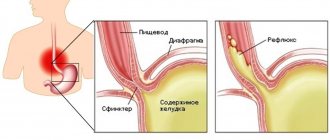During pregnancy, women experience various symptoms and discomfort.
They often indicate harm to the child and can threaten the health of the mother.
Therefore, even with such a harmless symptom as the appearance of dryness in the oral cavity, it is necessary to immediately determine the cause of the appearance, possible complications and how to bring the body back to normal .
After all, pregnancy is not a disease; it should not be difficult or unpleasant.
Causes
It is worth noting! During the period of bearing a child, young mothers often experience a restructuring of all their vital functions.
First of all, to ensure the vital functions of two organisms, a larger volume of blood, a special level of hormones, an increased amount of water and nutrients, as well as proper rest are needed.
Therefore,
if something is not performed to the required degree or is overloaded physically or emotionally, then such an imbalance causes various symptoms, including dry mouth .
Most often, dry mouth during pregnancy occurs due to:
- Eating hot , spicy, pickled, smoked, salty foods, carbonated drinks and natural coffee .
- Changes in mineral balance, most often excess magnesium and deficiency of potassium . With the help of a special diet enriched with tomatoes, potatoes, zucchini, dried apricots and other products, you can restore the required level of minerals.
- Some medications have a feeling of thirst as a side effect . Therefore, you need to either replace the drug or abandon it. If the harm from excluding treatment is greater than discomfort, it is necessary to obtain competent advice from a doctor.
- Diseases of the circulatory or nervous system, respiratory tract.
- Dehydration as a result of toxicosis or a shift in water balance. If drinking water or non-carbonated drinks is not possible, then dehydration through a dropper is necessary.
- Diseases of the endocrine system appear quite often and are associated with changes as a result of pregnancy. Therefore, to determine this factor as the main cause of dry mouth, you need to do a blood test for TSH levels.
- Diabetes in pregnant women appears due to a change in the balance in metabolic processes and hormonal functions. The symptom can pose a significant danger to the fetus and the woman. Therefore, the GTT test is performed primarily to exclude gestational diabetes.
Causes of nasal swelling in pregnant women
The reasons why nasal swelling may occur in pregnant women are physiological or pathological. Physiological reasons are due to natural changes in the body during this period. Pathological causes appear due to a malfunction of vital organs.
Physiological reasons
Among the physiological causes of nasal swelling it is worth highlighting:
- Changes in hormonal levels. Increasing progesterone levels is a prerequisite for pregnancy. This natural process entails the accumulation of sodium in the body, which prevents the removal of excess fluid.
- Increased blood volume levels. A woman’s body is subjected to a double load, because the supply of nutrients is necessary not only for her, but also for the child. The pressure on the walls of blood vessels increases, and as a result, blood enters the surrounding tissues.
- Decreased immunity. During pregnancy, the female body is weakened: all its strength goes into forming and protecting the fetus. If the immune system is weak (in particular, with vitamin deficiency), the risk of catching a virus and getting a cold increases significantly.
- Bacterial infection. It develops as a result of disruption of the natural microflora after bacteria (streptococci, staphylococci, pneumococci) enter the body. Swelling of the nose in this case is accompanied by the release of green mucus.
Treatment in these cases is aimed at eliminating negative symptoms.
Pathological causes
Swelling of the nasal mucosa in pregnant women can occur due to the following pathological reasons:
- diseases of the cardiovascular system;
- disorders of the kidneys and liver;
- the body's reaction to allergens;
- the presence of a benign neoplasm;
- pathologies in the structure of the nasal septum;
- mechanical damage to the pharynx;
- foreign body in the nasal passage;
- symptoms of gestosis (late toxicosis);
- the presence of rhinitis, polyps or adenoids;
- alcohol abuse;
- influence of environmental factors.
Pathological causes of nasal swelling pose a serious threat to the health of the fetus. They require immediate diagnosis. The goal of treatment is to eliminate the root cause of the problem.
Features of the causes of symptoms in the early stages
Stay up to date! Almost every woman's early pregnancy is accompanied by severe toxicosis - vomiting, mainly in the first half of the day.
The body not only loses a lot of fluid, but also a lot of useful substances . In addition, women lose their appetite and eat less food. This may also be due to the fear of repeated attacks of nausea.
However, you should not simply replenish your water balance by drinking too much fluid. Because this can cause swelling in different parts of the body and legs in particular.
Heat and high temperatures in dry climates cause hyperhidrosis.
This means losing some of the body's moisture through sweating.
Some diseases, for example, hypertension, anemia, chronic and inflammatory processes are accompanied by a sign of dry mouth.
A thorough examination should be performed to exclude this cause or confirm it. Only then is any action taken.
Keep in mind! Along with toxicosis during pregnancy, taste sensations and preferences change.
Uncontrolled consumption of any food group or lack of a balanced diet well cause a feeling of dry mouth.
smoking during pregnancy. After all, this bad habit not only dries out the mucous membranes of the mouth, but also changes the level of water balance .
also analyze the emotional situation. Since the feeling of thirst is often directly related to severe stress and anxiety.
How to treat nasal swelling during pregnancy?
Treatment of nasal swelling during pregnancy should be under the supervision of a doctor. Today there are many remedies for the common cold, but not all of them are suitable for the expectant mother and her child.
To help eliminate swelling:
- Rinsing the nose with a solution of sea water (you can use ready-made products or make them yourself).
- Physiotherapeutic treatment using ultrasonic inhalation based on products of plant origin.
- The use of specific anti-allergy drugs in case of detection of an allergic reaction.
- Taking antibacterial agents to fight infection (if local treatment does not work).
- Drinking plenty of water to prevent dehydration.
An effective remedy in the fight against nasal swelling is “Sialor Aqua” - an isotonic solution in a convenient release form. In addition to purified sea water, it contains valuable microelements: magnesium, sodium, calcium, potassium and others. The drug is sold in anatomical ampoules, which reduce the likelihood of sinus injuries.
Irrigation of the nasal cavity with Sialor Aqua will help a pregnant woman maintain the natural microflora of the mucous membrane, clearing it of bacteria and viruses. With this drug you stimulate regenerative processes, reduce inflammation, and also normalize the production of internal defense factors of the immune system. All this will ensure proper breathing for a long period of time.
Why might it occur at night?
At night, the salivary glands of a pregnant woman significantly reduce the intensity of liquid secretion.
Need to know! If you take any specific medications, then the risk of feeling thirsty in the morning increases several times.
This is due to the fact that the body begins to require twice the amount of water consumed to replenish the daily fluid intake.
Among the actual causes, dry mouth can be caused by an air conditioner running at night, dry or dusty air in the bedroom, or mouth breathing.
Also, the appearance of a symptom can be caused by eating some foods or spicy salty dishes immediately before falling asleep.
Danger in case of this symptom, which doctor should I contact?
The symptom itself does not pose to the health of the woman or the life of the baby .
Note! It is more necessary to worry about the true reason for the occurrence of such a phenomenon.
After all, the presence of a chronic disease, inflammatory processes with foci in the acute stage and other problems that cause dryness in the oral cavity can develop into more aggressive forms.
And they will require immediate treatment. If you “sleep through” the onset of the development of a serious disease , then often treatment not only requires more effective measures. It may also be necessary to use toxic drugs that can affect the formation of the body and tissues of the unborn baby.
Therefore, as soon as the first signs appear or discomfort in the mouth does not stop, you need to contact your family doctor or observing gynecologist.
After several standard tests and tests (usually blood, urine and general indicators of the body), he may suspect the presence of a disease.
also write out a referral to a more specialized specialist .
Remember! Any delays in seeking medical help in case of dry mouth during pregnancy can lead to placental insufficiency, gestosis and other threats to the health and even life of the child.
Medicines or smoking provoke the appearance or worsening of various oral diseases.
First of all, these are all kinds of stomatitis of the mucous membranes and tongue, gingivitis - inflamed gum tissue, etc.
Poor salivation does not allow the body to independently fight the pathogenic microflora that lives in the human oral cavity.
Therefore, with dry mouth, soft tissue inflammation often very quickly develops into an acute form or spreads over large areas .
Any advanced diseases require prompt administration of potent drugs and even antibiotics.
Need to know! For a child, such substances are harmful and can provoke developmental pathologies.
Diagnostics
To know how to relieve swelling of the nasal mucosa, you need to conduct a diagnosis. At the initial stage, the otolaryngologist collects an anamnesis. The patient talks about unpleasant symptoms that bother her. After this, a manual examination (palpation) is performed. The doctor examines the nasal mucosa, determines the presence/absence of mucus, and also determines the severity of infiltrative changes. More detailed diagnostics include laboratory and instrumental research methods.
Laboratory research methods
Diagnosis of the disease in laboratory conditions allows one to assess the level of pathological secretion in the nasal cavity.
| Type of research | Research result |
| Bacteriological methods | The procedure allows you to identify the nature of the origin of bacteria in the body (blood, urine, feces, sputum are used as biological material) |
| Biochemical methods | Using biochemical analysis of fluid, it is possible to determine not only the degree of functionality of organs, but also the content of certain substances (enzymes and electrolytes) in them. |
| Cytological methods | The cytological diagnostic method involves the study of test material in order to determine the nature of the pathological process in tissues |
| Immunological methods | Assessment of the quality of systemic immunity includes analysis of interferon and infectious status indicators, as well as autoimmunological examination |
| Assessment of the quality of local immunity is based on data from sputum analysis, coprogram and determination of the level of secretory immunoglobulin A | |
| Allergological methods | The procedure for collecting skin allergy tests makes it possible to identify the degree of tolerance of the body to specific substances and allergens. |
Instrumental research methods
If we are talking about severe swelling of the nose, the diagnosis of a pregnant woman should be carried out on the basis of instrumental methods. In this case the following applies:
- Rhinoscopy.
Rhinoscopy is a technique for assessing the condition of the patient’s nasal cavity. It allows you to establish the presence of an inflammatory process, as well as its form and nature of course in the nasopharynx and paranasal sinuses. Two instruments are used for the procedure: a speculum and a speculum. The mirror has the appearance of a metal funnel, which expands the passage to such an extent that it becomes accessible for inspection. Anterior rhinoscopy involves examining the bottom of the nasal cavity and the anterior part of the turbinate, posterior rhinoscopy - the posterior sections of all three passages, as well as the nasopharynx. - Endoscopy.
If it is not possible to examine anatomical changes using a conventional mirror, the doctor performs an endoscopy. Endoscopy involves a visual examination of the internal cavity, as well as the paranasal sinuses. During the examination, a light-conducting device with fiber optics is used - an endoscope. The diameter of the endoscope is only 3 millimeters, thanks to which it is possible to examine such hard-to-reach places as shells, vascular sinuses, and septums. A rigid or flexible endoscope can be used for the procedure. - X-ray.
Fluoroscopy is a diagnostic method that involves shining through the tissues of the nose with ultraviolet rays. It makes it possible to identify abnormal abnormalities in the development of an organ (tumors, polyps, neoplasms). Fluoroscopy allows you to diagnose the inflammatory process, as well as determine the presence of a foreign body and other injuries to the facial skeleton. - Diaphanoscopy.
Diaphanoscopy involves examining the nasal sinuses using a diaphanoscope equipped with a xenon or halogen lamp. It creates a strong light flux that illuminates the upper jaw area. The purpose of the procedure is to diagnose pathological proliferation of the mucous membrane (sinusitis, frontal sinusitis, sphenoiditis). Mainly used when there is pus or serous fluid in the nasal cavity.
Prevention
the pregnant woman does not have any serious illnesses in her anamnesis , then it is quite simple for her to ensure that dry mouth does not even appear.
To do this, you need to lead a healthy lifestyle and activity. It is necessary to normalize physical and intellectual loads , as well as regulate sleep and rest patterns.
Recommendations
For your information! There are a number of other recommendations for preventing dry mouth:
- completely review your diet , eliminating most sweet foods from it. And also completely salty and spicy dishes, regardless of the method of preparation. Eating juicy fruits and vegetables daily replenishes the deficiency of microelements and minerals. It also replenishes moisture and prevents dehydration;
- The water balance must be controlled very strictly. So on ordinary days, the consumption of non-carbonated drinks and plain or mineral water (necessarily without gas) should be at least 1-1.5 liters. On hot and frosty dry days, moisture is lost by the body faster and more intensely. Therefore, to replenish the previous level, you will need at least 2 liters of unsweetened drink. This event is especially relevant during the period of toxicosis. At this time, a woman loses a lot of fluid from her body every day;
- any tobacco products or alcoholic cocktails, even at a low level, should not be present in the lifestyle of the expectant mother . These products greatly drain the body and require even more fluid intake. Excessive drinking can lead to swelling and other problems of the excretory system;
- If the air humidity level in the room is too low, additional humidification will be needed. If possible, it is better to use an air ionizer or ultrasonic humidifier. On the other hand, you can simply place several wide, flat containers with clean water. It will evaporate, thus increasing the humidity of the microclimate;
- The condition of the teeth and mucous membranes , as well as the soft tissues of the oral cavity, requires constant monitoring. Any diseases or developing bacterial microflora in the mouth can cause discomfort. Therefore, skipping brushing your teeth is not recommended.
Important! The cause of the feeling of thirst or dry mouth can be almost any factor that is almost impossible to accurately determine on your own.
If you experience any early signs of dry mouth, you should seek help from a doctor and undergo a thorough examination.
Changed taste preferences, as well as the functioning of a pregnant woman’s body, make it difficult for her to adequately assess her real sensations.
Postpartum period
This period includes the lactation period. During the period of feeding a child, a woman also loses a huge amount of minerals, such as calcium, fluorine, phosphorus and many others. And again, the main source for “washing out” them is teeth. After the baby is born, it is important to continue remineralization of dental tissues. During the year, a nursing mother must undergo at least 4 procedures. After completing feeding, the impregnation of dental tissues with microelements can be reduced to 2 times a year by combining remineralization with professional hygiene and a routine dental examination.
Pregnancy and childbirth are the most wonderful period in the life of every woman. Our goal is to make it easy for you and your teeth remain strong and healthy! We are ready to help you with this.
Useful video
From this video you will learn about changes in the digestive system and the appearance of unpleasant symptoms during pregnancy:
Dry mouth is a very common symptom for pregnant women , which appears in response to all sorts of factors.
This may be taking certain medications or products, toxicosis, hyperhidrosis, pathological conditions and various diseases, and even the psychological situation.
Therefore, there is no point in delaying it, because a symptom is not a problem, but only a signal about its presence in the human body.
Symptoms and signs
The following symptoms are typical for nasal swelling during pregnancy:
- nasal congestion,
- moist cough,
- moderate sneezing,
- feeling of dry mucous membranes,
- itchy nose,
- night snoring and apnea (stopping breathing during sleep for more than 10 seconds).
Difficulty breathing is caused by insufficient air entering the lungs. The level of oxygen supply in the body decreases. The mucous membrane of the upper respiratory tract dries out and becomes damaged. All this provokes a deterioration in the woman’s general well-being. Lack of sleep leads to the fact that she is often irritated, becomes depressed, and loses her appetite.
With rhinitis, joint and muscle pain, impaired sense of smell and nasal voice are observed. In case of a bacterial infection, your body temperature may rise.











